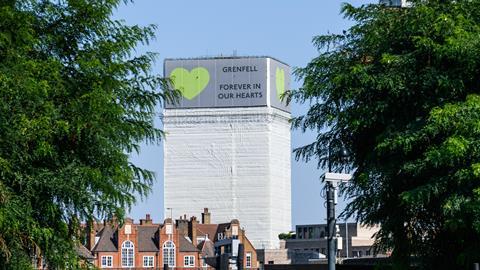A judge-led inquiry on the fire at Grenfell Tower in June 2017 that claimed the lives of 72 people has concluded that the government should be under a legal duty to record safety recommendations made by coroners and official bodies.
In a public statement at the final report's publication today, Sir Martin Moore-Bick said: 'The simple truth is that the deaths that occured were all avoidable. Those who lived in the tower were badly failed over a number of years and in a number of different ways by those responsible for ensuring the safety of the building and its occupants.'
Following publication of the first phase report in October 2019, Moore-Bick said the second phase examined the underlying causes of the fire with a view to identifying where mistakes were made and ensuring a similar disaster cannot occur again.
Recommendations include a legal requirement for the government to maintain a publicly accessible record of recommendations made by select committees, coroners and public inquiries, with a description of the steps taken in response. The government would be required to record its reasons for not accepting any recommendations.
The inquiry said its investigations revealed that some important recommendations affecting fire safety were ignored by government in the years leading up to the fire.
‘Recommendations made by the select committee in 1999 were not implemented and the department’s response to the recommendations made by the Lakanal House coroner was inadequate. The department had no system for recording recommendations made by public bodies or keeping track of its response to them. That was obviously unsatisfactory,’ the report said.
The inquiry recommends the establishment of a construction regulator responsible to a single secretary of state.
The report acknowledges that the Building Safety Act establishes a building safety regulator – but responsibility for functions such as the regulation of construction products and monitoring of the operation of building regulations remains dispersed.
‘The fragmentation of responsibility for regulating the construction industry is currently mirrored in the range of government departments responsible for matters affecting fire safety,’ the report adds.
Responsibility for the functions relating to fire safety currently exercised by the Ministry of Housing, Communities and Local Government, Home Office and Department for Business and Trade should be brought into one department under a single secretary of state, the inquiry recommends.
The Civil Contingencies Act 2004 gives the government ‘far reaching’ powers to intervene in response to an emergency, but the inquiry concludes that these did not enable the government to intervene promptly or decisively. The inquiry recommends consideration be given to granting a secretary of state the power to carry out the functions of a 'category 1 responder' for a limited period.
Moore-Bick ended his public statement by reading the names of those who died in the fire.
This article is now closed for comment.




























8 Readers' comments